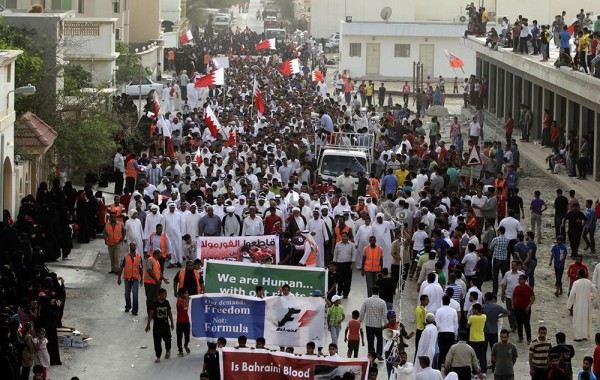HRW Calls to Pressure on FIA to Prevent F1 from Ignoring HR Violations in Bahrain

2019-03-23 - 7:43 am
Bahrain Mirror: Human Rights Watch (HRW) said that the Formula One Group disregards its human rights commitments and overlooks grave rights abuses in Bahrain, stressing that some of the abuses appear to be directly related to Formula One's activities in the country.
HRW said in a statement issued on Friday (March 22, 2019) that Bahrain has a longstanding record of arresting and harassing dissents, including those opposing the Grand Prix races, which are scheduled this year for March 31, 2019. But the Formula One organizers rely on baseless assurances from the Bahraini authorities claiming respect for human rights.
Formula One's governing body, the Fédération Internationale de l'Automobile (FIA), should adopt and carry out a human rights policy that would identify risks and make use of its leverage to end rights abuses.
Formula One race will be held in Bahrain at the end of this month.
"Formula organizers should not look the other way while Bahrain uses the publicity and grandeur of the races while stepping up repression against people who oppose holding the race in Bahrain," said Minky Worden, global initiatives director at Human Rights Watch.
Human Rights Watch encouraged concerned athletes and people around the world to write directly to FIA President Jean Todt and Formula One Chairman Chase Carey. The letter writers should encourage Formula One to adopt a human rights policy similar to those recently adopted by companies and other major sporting organizations, including the Fédération Internationale de Football Association (FIFA).
The organization noted in a length statement that Bahraini demonstrators have used the occasion of the Formula One races to protest the country's human rights record, and every year, the Bahraini authorities respond with repression, which led to the death of a Bahraini citizen in 2012.
It also discussed the arrest, torture and sexual assault case of activist and blogger Najah Yousef after series of posts critical of the 2017 Bahrain Grand Prix and then sentencing her over charges directly related to criticizing the race.
HRW considered Formula One reply to the letters sent by the organizing demanding Formula One's to intervene in Najah's case as an ignorance to the persistent human rights violations in Bahrain
Formula One indicated in its reply to the organization that Najah's charges and conviction have "absolutely no relation to the Formula One race and that it relies on assurances from the Bahraini authorities that "no punitive measures will be taken against any other activists" for peaceful opposition to the races.
HRW stressed that Bahrain's pursuit of peaceful critics includes persecution overseas, as in the case of the refugee football player Hakeem Al-Araibi.
In keeping with the Organisation for Economic Cooperation and Development's (OECD) Guidelines for Multinational Enterprises, Formula One has a duty to prevent or mitigate adverse human rights impacts resulting from its business operation.
The recent creation of the Geneva-based Center for Sports and Human Rights and FIFA's adoption of an internal human rights policy demonstrate a marked shift in the sporting world's understanding that the rules of human rights apply to it too. FIFA, the International Olympics Committee (IOC), and the Center for Sports and Human Rights were instrumental in seeking the release of Al-Araibi, from a Thai prison earlier this year.
"Formula One has an opportunity to join other sporting organizations in advancing the respect for human rights in the areas in which it operates," Worden said. "Adopting a human rights policy is the best way to avoid being driven to endorse repressive host countries' abusive records."
- 2024-07-10Bahraini Authorities Summon Head of Sanabis Ma'tam, Threaten "Actions" Due to Mourners' Chants Against Israeli Occupation
- 2024-07-10Political Prisoner Mohammad Al-Raml's Family Say He's Vomiting Blood Due to Poor Conditions, Fear for His Life
- 2024-07-09Ali Al-Majed Arrested After His Return to Bahrain
- 2024-07-08Yusuf Al-Muhafdha: Convicted Returnees to Bahrain Have the Right to a Lawyer, Retrial, and Legal Guarantees
- 2024-07-08Reciter Mahdi Sahwan: Head of Manama Police Informed Me of Ban on Reciters Traveling to Commemorate Ashura